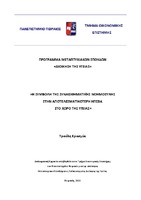Η συμβολή της συναισθηματικής νοημοσύνης στην αποτελεσματικότερη ηγεσία στο χώρο της υγείας
The contribution of emotional intelligence in effective leadership in the field of health

Προβολή/
Θεματική επικεφαλίδα
Συναισθηματική νοημοσύνηΛέξεις κλειδιά
Ηγεσία ; Μετασχηματιστική ηγεσία ; Συναλλακτική ηγεσία ; Ηγεσία προς αποφυγή ; Emotional intelligence ; Leadership ; Transformational leadership ; Transactional leadership ; Laisser - faire ; ΝοσοκομείαΠερίληψη
Η συναισθηματική νοημοσύνη, όπως καταδεικνύει πλήθος ερευνών, διαδραματίζει
σημαντικό ρόλο στην υιοθέτηση και άσκηση αποτελεσματικής ηγεσίας. Σκοπός της
παρούσας έρευνας είναι η διερεύνηση των μορφών ηγεσίας που υιοθετούνται από τους
διευθυντές και τους προϊσταμένους των δημοσίων και ιδιωτικών νοσοκομείων της
Αττικής. Επίσης διερευνήθηκαν οι παράγοντες της συναισθηματικής νοημοσύνης
(ευημερία, αυτοέλεγχος, συναισθηματικότητα και κοινωνικότητα) καθώς και το στυλ
ηγεσίας (Μετασχηματιστική ηγεσία, Συναλλακτική ηγεσία και Ηγεσία προς αποφυγή)
που επικρατεί περισσότερο στα νοσοκομεία της πρωτεύουσας. Η σχέση των δυο
παραπάνω μεταβλητών (συναισθηματική νοημοσύνη και ηγεσία) με τα κοινωνικο-
δημογραφικά χαρακτηριστικά των ερωτηθέντων αποτέλεσε ένα άλλο πεδίο έρευνας της
παρούσας διπλωματικής.
Το δείγμα για τη διεξαγωγή της έρευνας αποτελείται από 64 διευθυντές και
προϊσταμένους ιδιωτικών και δημοσίων νοσοκομείων της Αττικής, τα ερωτηματολόγια
που χρησιμοποιήθηκαν είναι το ερωτηματολόγιο της Συναισθηματικής Νοημοσύνης
(Trait Emotional Intelligence Questionnaire – TEIQue-SF) των Petrides K.V &
Furnham, A. (2003) καθώς και το Πολυπαραγοντικό Ερωτηματολόγιο της ηγεσίας
(Μultifactor Leadership Questionnaire - M.L.Q) των Avolio & Bass (2004) ενώ η
ανάλυση των αποτελεσμάτων έγινε με τη χρήση του SPSS20.
Τα αποτελέσματα της έρευνας επιβεβαίωσαν την βασική ερευνητική υπόθεση ότι
υπάρχει θετική συσχέτιση μεταξύ της συναισθηματικής νοημοσύνης και της ηγεσίας.
Συγκεκριμένα διαπιστώθηκε ότι το κυρίαρχο στυλ ηγεσίας είναι η Μετασχηματιστική
ηγεσία, η οποία έχει στατιστικά σημαντική θετική σχέση με όλους τους παράγοντες της
συναισθηματικής νοημοσύνης ενώ η ηγεσία προς αποφυγή δεν ασκείται σχεδόν
καθόλου και έχει στατιστικά σημαντική αρνητική σχέση με τους παράγοντες ευημερία
και κοινωνικότητα, καμία συσχέτιση με τη συναισθηματικότητα και ασθενή σχέση με
τον αυτοέλεγχο. Όσον αφορά στη Συναλλακτική μορφή ηγεσίας διαπιστώθηκε ότι η
πλειοψηφία χρησιμοποιεί κάποια στοιχεία αυτού του είδους (έκτακτη ανταμοιβή και
ενεργητική διαχείριση) ενώ παρατηρήθηκε να υπάρχει στατιστικά σημαντική σχέση με
την ευημερία και την κοινωνικότητα και απουσία στατιστικά σημαντικής σχέσης με τον
αυτοέλεγχο και τη συναισθηματικότητα.
Τέλος η έρευνα αναφέρεται σε κάποιους περιορισμούς σχετικά με τη μεθοδολογία
που ακολουθήθηκε και το μικρό δείγμα καθώς και τη συναισθηματική νοημοσύνη και
ηγεσία ως νοητικά οικοδομήματα. Έγιναν μάλιστα και κάποιες προτάσεις που
προτρέπουν τη διεξαγωγή μελλοντικών ερευνών. Οι προτάσεις αυτές αφορούν τη
πραγματοποίηση έρευνας η οποία θα καταγράφει την προσωπική εκτίμηση για τη
συναισθηματική νοημοσύνη και τα ηγετικά χαρακτηριστικά των διευθυντών των
ελληνικών νοσοκομείων τόσο από την πλευρά των υφισταμένων όσο και από την
πλευρά των ίδιων των διευθυντών. Επίσης έγινε πρόταση ώστε να πραγματοποιηθεί
έρευνα σε μεγαλύτερο δείγμα και σε πανελλαδικό επίπεδο.


